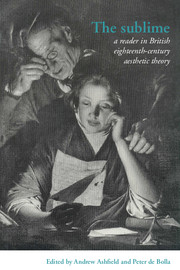Book contents
- Frontmatter
- Contents
- List of Abbreviations
- Introduction
- Part I The Longinian tradition
- Part II Rhapsody to rhetoric
- Part III Irish Perspectives
- Part IV The Aberdonian Enlightenment
- Part V Edinburgh and Glasgow
- 34 A treatise of human nature (1739-40)
- 35 A critical dissertation on the poems of Ossian (1763)
- 36 Lectures on rhetoric and belles lettres (1783)
- 37 Elements of criticism (1765)
- 38 Essays on philosophical subjects (1758/1795)
- 39 The theory of moral sentiments (1759/1790)
- 40 An essay on the history of civil society (1767)
- Part VI From the Picturesque to the Political
- Sources and further reading
38 - Essays on philosophical subjects (1758/1795)
Published online by Cambridge University Press: 05 June 2012
- Frontmatter
- Contents
- List of Abbreviations
- Introduction
- Part I The Longinian tradition
- Part II Rhapsody to rhetoric
- Part III Irish Perspectives
- Part IV The Aberdonian Enlightenment
- Part V Edinburgh and Glasgow
- 34 A treatise of human nature (1739-40)
- 35 A critical dissertation on the poems of Ossian (1763)
- 36 Lectures on rhetoric and belles lettres (1783)
- 37 Elements of criticism (1765)
- 38 Essays on philosophical subjects (1758/1795)
- 39 The theory of moral sentiments (1759/1790)
- 40 An essay on the history of civil society (1767)
- Part VI From the Picturesque to the Political
- Sources and further reading
Summary
The principles which lead and direct philosophical enquiries; illustrated by the history of astronomy
Wonder, Surprise, and Admiration, are words which, though often confounded, denote, in our language, sentiments that are indeed allied, but that are in some respects different also, and distinct from one another. What is new and singular, excites that sentiment which, in strict propriety, is called Wonder; what is unexpected, Surprise; and what is great or beautiful, Admiration.
We wonder at all extraordinary and uncommon objects, at all the rare phaenomena of nature, at meteors, comets, eclipses, at singular plants and animals, and at every thing, in short, with which we have before been either little or not at all acquainted; and we still wonder, though forewarned of what we are to see.
We are surprised at those things which we have seen often, but which we least of all expected to meet with in the place where we find them; we are surprised at the sudden appearance of a friend, whom we have seen a thousand times, but whom we did not imagine we were to see then.
We admire the beauty of a plain or the greatness of a mountain, though we have seen both often before, and though nothing appears to us in either, but what we had expected with certainty to see. …
… All that I contend for is, that the sentiments excited by what is new, by what is unexpected, and by what is great and beautiful, are really different, however the words made use of to express them may sometimes be confounded.
- Type
- Chapter
- Information
- The SublimeA Reader in British Eighteenth-Century Aesthetic Theory, pp. 233 - 243Publisher: Cambridge University PressPrint publication year: 1996
- 2
- Cited by



